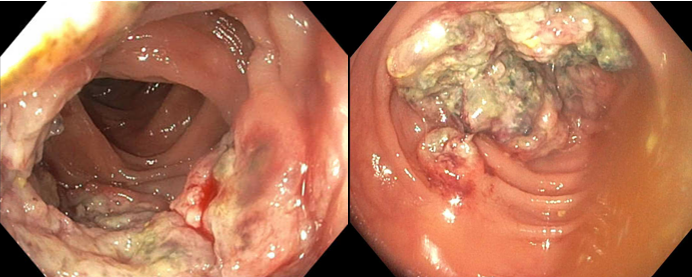Tuesday Poster Session
Category: Colon
P4610 - Beyond Colorectal: A Hidden Gynecologic Tumor in the Colon
Tuesday, October 28, 2025
10:30 AM - 4:00 PM PDT
Location: Exhibit Hall

Rama Tarakji, MD, MPH
Mount Sinai Medical Center
Miami Beach, FL
Presenting Author(s)
Rama Tarakji, MD, MPH1, Mohamed Karam Douedari, MD1, Mahmoud Mahfouz, MD2
1Mount Sinai Medical Center, Miami Beach, FL; 2University of Miami Miller School of Medicine, Miami, FL
Introduction: Gestational Choriocarcinoma is an aggressive form of gestational trophoblastic disease (GTD) that can occur after gestational events and spread hematogenously. Common sites for metastasis include the lungs, liver, and central nervous system. Involvement of the gastrointestinal tract is rare. We present a 51-year-old woman with a history of choriocarcinoma who was found to have a descending colon mass after remission, consistent with choriocarcinoma.
Case Description/
Methods: A 51-year-old woman with a prior diagnosis of GTN, underwent total hysterectomy with bilateral salpingo-oophorectomy (TAH-BSO). Five years later, disease recurred in the lungs and brain and received multi-agent chemotherapy, including EMA/CO and EMA/EP regimens, whole brain radiation therapy (WBRT), and long-term immune checkpoint inhibition with pembrolizumab and bevacizumab. Two years later, she was referred for a colonoscopy after CT of the abdomen and pelvis showed colonic wall thickening at the splenic flexure. Subsequent colonoscopy showed a large, fungating, infiltrative, and ulcerated mass in the proximal descending colon. The lesion was non-obstructing but partially circumferential, involving two-thirds of the luminal circumference and measuring 5 cm in length. Histopathology confirmed metastatic gestational choriocarcinoma, and tumor cells stained positive for hCG and SALL4 and negative for HPL and SATB2, consistent with GTN. Follow-up images showed no evidence of metastatic disease in the lungs, brain, abdomen, or pelvis.
Discussion: Metastatic gestational choriocarcinoma rarely involves the GI tract and is reported in less than 5% of cases, with the stomach being the most common location. Primary colon choriocarcinoma was reported in limited cases. It is aggressive and commonly has a component of adenocarcinoma. Recurrence of the disease in the colon is uncommon, with isolated recurrence in the colon being exceptionally rare. Despite extensive prior treatment and the lack of symptoms, the patient was found to have a biopsy-proven, isolated descending colon lesion on colonoscopy with no evidence of disease anywhere else on extensive imaging. Finally, isolated gestational choriocarcinoma recurrence in the colon is rare but should be considered in patients with prior GTN and new GI symptoms or imaging findings. Involvement of atypical sites makes the diagnosis challenging. Early detection through surveillance and accurate histopathologic diagnosis is key for timely management.

Figure: Colonoscopy images showing a 5 cm large, fungating, infiltrative, and ulcerated mass in the descending colon.
Disclosures:
Rama Tarakji indicated no relevant financial relationships.
Mohamed Karam Douedari indicated no relevant financial relationships.
Mahmoud Mahfouz indicated no relevant financial relationships.
Rama Tarakji, MD, MPH1, Mohamed Karam Douedari, MD1, Mahmoud Mahfouz, MD2. P4610 - Beyond Colorectal: A Hidden Gynecologic Tumor in the Colon, ACG 2025 Annual Scientific Meeting Abstracts. Phoenix, AZ: American College of Gastroenterology.
1Mount Sinai Medical Center, Miami Beach, FL; 2University of Miami Miller School of Medicine, Miami, FL
Introduction: Gestational Choriocarcinoma is an aggressive form of gestational trophoblastic disease (GTD) that can occur after gestational events and spread hematogenously. Common sites for metastasis include the lungs, liver, and central nervous system. Involvement of the gastrointestinal tract is rare. We present a 51-year-old woman with a history of choriocarcinoma who was found to have a descending colon mass after remission, consistent with choriocarcinoma.
Case Description/
Methods: A 51-year-old woman with a prior diagnosis of GTN, underwent total hysterectomy with bilateral salpingo-oophorectomy (TAH-BSO). Five years later, disease recurred in the lungs and brain and received multi-agent chemotherapy, including EMA/CO and EMA/EP regimens, whole brain radiation therapy (WBRT), and long-term immune checkpoint inhibition with pembrolizumab and bevacizumab. Two years later, she was referred for a colonoscopy after CT of the abdomen and pelvis showed colonic wall thickening at the splenic flexure. Subsequent colonoscopy showed a large, fungating, infiltrative, and ulcerated mass in the proximal descending colon. The lesion was non-obstructing but partially circumferential, involving two-thirds of the luminal circumference and measuring 5 cm in length. Histopathology confirmed metastatic gestational choriocarcinoma, and tumor cells stained positive for hCG and SALL4 and negative for HPL and SATB2, consistent with GTN. Follow-up images showed no evidence of metastatic disease in the lungs, brain, abdomen, or pelvis.
Discussion: Metastatic gestational choriocarcinoma rarely involves the GI tract and is reported in less than 5% of cases, with the stomach being the most common location. Primary colon choriocarcinoma was reported in limited cases. It is aggressive and commonly has a component of adenocarcinoma. Recurrence of the disease in the colon is uncommon, with isolated recurrence in the colon being exceptionally rare. Despite extensive prior treatment and the lack of symptoms, the patient was found to have a biopsy-proven, isolated descending colon lesion on colonoscopy with no evidence of disease anywhere else on extensive imaging. Finally, isolated gestational choriocarcinoma recurrence in the colon is rare but should be considered in patients with prior GTN and new GI symptoms or imaging findings. Involvement of atypical sites makes the diagnosis challenging. Early detection through surveillance and accurate histopathologic diagnosis is key for timely management.

Figure: Colonoscopy images showing a 5 cm large, fungating, infiltrative, and ulcerated mass in the descending colon.
Disclosures:
Rama Tarakji indicated no relevant financial relationships.
Mohamed Karam Douedari indicated no relevant financial relationships.
Mahmoud Mahfouz indicated no relevant financial relationships.
Rama Tarakji, MD, MPH1, Mohamed Karam Douedari, MD1, Mahmoud Mahfouz, MD2. P4610 - Beyond Colorectal: A Hidden Gynecologic Tumor in the Colon, ACG 2025 Annual Scientific Meeting Abstracts. Phoenix, AZ: American College of Gastroenterology.
